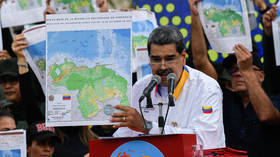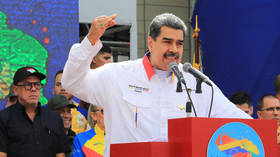Guyana vows to defend itself ‘by all means’ amid territorial dispute

Guyana will defend itself by any means available amid escalating tensions with Venezuela, Vice President Bharrat Jagdeo has stated. The warning comes in response to attempts by Caracas to claim the long contested and oil-rich border region of Essequibo, and the mobilization of Venezuela’s army at the Guyanese border.
“We will defend our country by all and any means whatsoever,” Jagdeo told the Financial Times on Wednesday. Guyana is exploring “stronger defense cooperation” with their allies, including the US, he went on to say, without expanding further.
US Secretary of State Antony Blinken reaffirmed Washington’s support of the country’s sovereignty in a call with Guyanese President Irfaan Ali last Wednesday.
“We believe we have the capability to deter Venezuela and to thwart any aggressive intent on our country,” Jagdeo stated, while admitting, however, that the Guyana Defence Force (GDF) is vastly outnumbered by the Venezuelan Army. By his estimation, the GDF’s 4,070 active personnel and reserves stands against Venezuela’s 351,000.
The recently mobilized Venezuelan army was ordered by President Nicolas Maduro to the border regions next to Essequibo, or “Guayana Esequiba” as Caracas refers to the area. Venezuela’s latest bid for the contested oil rich region is the last in a spiral of fermenting tensions that have been going on since the 19th century.
The territorial dispute stems from the US’ arbitration in 1899 to designate Essequibo to what was then British Guiana – a move Caracas never accepted as legitimate.
Early in December, a referendum in Venezuela supported Maduro’s move to reject the 1899 adjudication and any International Court of Justice jurisdiction over the matter. Additionally, it endorsed the government plan to offer Venezuelan citizenship to residents of the currently Guyana-administered area.
This latest row over Essequibo has been simmering since 2015, when energy giant ExxonMobil discovered oil to the estimated value of 11bn barrels offshore in the contested coastal waters of the region.
The presidents of Guyana and Venezuela are scheduled to meet this Thursday in St. Vincent and the Grenadines to discuss the border dispute.
While Guyana’s president stated earlier this week that the land boundary is not up for negotiation, his VP sees the meeting as important. “There’s always a need to talk, especially between two countries that will forever be neighbors,” Jagdeo said.













